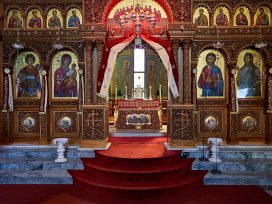Is there an answer to the question about the exact origin of a nation? It is a question that cannot be answered even today, in the twenty-first century, in times of huge technological progress, international rule of the law, democracy, mutual tolerance and respect. “Respect yourself”: this has been a classic and timeless credo ever since ancient times, one that moved the enlightening processes in the right direction and, today, it represents the path towards personal success. If we respect ourselves without vanity or glorification, we shall also respect others, those that are different from us. This is the key postulate of multi-ethnicity, the basis for the construction of the global world, in which everyone ought to nurture their own cultural legacy, and through differences come to an acceptance of and get to know each other. The Macedonian-Greek conflict has sprung out of this very same lack of respect from Greek politics for the Macedonian cultural and historical legacy, for the Macedonian people and its identity.
Macedonia is a country whose name has persevered ever since ancient times. Its territory changed throughout history depending on political events and circumstances. The people living on its territory have always existed in a multi-ethnic and multicultural environment, starting from ancient times, through the Roman, Byzantine and Ottoman empires, during the former Yugoslavia, up until today. What is typical of Macedonia is that, rather than embarking on missions of conquest, it did quite the opposite. Cultural projects were educational and enlightening: think of the mission of St Cyril and St Methodius to spread Slavic literacy, or the pan-Slavism of painter Hristofor Zhefarovich, or the ideology of the Macedonian revolutionary Goce Delchev, who understood the world as a field for cultural competition between nations.
In the nineteenth century, the cultural communities characteristic of the ancient world were transformed into nations; they now have to preserve their own identity in the twenty-first century. The construction of peoples’ identity in the past, its dynamics, was largely influenced by social, political and cultural conditions, as well as by conquests, migratory movements and wars. People therefore mixed with one another, whether through marriage or by imposing cultural habits and customs. Hence, it is exceptionally difficult to define the genetic code of one nation, to determine the pure blood, especially in ancient times, but also nowadays. Bearing this in mind, what follows is a search for the source of the Macedonian-Greek dispute about the name Macedonia.
Thinking about this question, I came upon the Descartes comment, “I have never thought about anything higher than the reform of my own thoughts”. Reading this, it occurred to me that not only my people, but also the Greek people live in a sort of a delusion. Ernest Gellner held that delusion lies in culture, and that culture is a form of systematic delusion induced by the community, one that is historically accumulated.
In the case of the majority of Macedonians, the delusion is that our origin sprung solely from the Slavic people, who moved to Macedonian territory from behind the Carpathian mountains, and not that, after the settlement of the Slavic tribes on Macedonian territory, “the newcomers mixed with the native people, assimilating quickly, thus creating the future ethnic amalgam of the Sklavinians or the Macedonian Slavs, in other words the Macedonians”.
The delusion on the part of the Greek people lies in their claiming of exclusive rights to the life and work of Phillip II and Alexander the Great. In doing so, Greek politics today negates its own cultural legacy: it negates Demosthenes, who made a clear distinction between the Macedonians and the Hellenics, especially in his speeches against Phillip II, such as when he invites “all Hellenics to join forces and not to let a ‘barbarian’, a man who is not of Hellenic origin, a man who is not of the same kind, as Isocrates says, conquer the Hellenic cities”. “Could there be anything newer than a Macedonian man fighting with the Athenians and discussing the matters of the Hellenics?” he asks. Demosthenes emphasized that Phillip II could not be a Hellenophile due to his barbarian origin, that he was in no way connected to the Hellenics, that he was not even a foreigner with a decent origin, but simply a miserable Macedon. Today Greeks even question Herodotus, who maintained that the basic constituents the Hellenism were “the same blood, the same language, the same religion and customs”. It is precisely these things that distinguished Macedonians and the Greeks. And it is precisely these things that have become the subject of enquiry on the part of foreign researchers today.
Eugene Borza, in his book In the Shadow of Olympus: The Emergence of Macedon, writes about the different ethnic identity of the Macedonians and the Hellenics, about the distinction between the Macedonian and the Greek language, and about Macedonian customs, which differed from those of the Greek city-states. The Macedonians, Borza emphasizes, were excluded from pan-Hellenic festivals at which only Greeks were allowed to participate etc.
As regards the linguistic question, there growing opinion about the distinction of the Macedonian from the Greek languages from the ancient period onwards. This was largely elaborated by John Shea in his book Macedonia and Greece: The Struggle to Define a New Balkan Nation, in which he consults various international scholars and academics. The book states that, “at first, the language of the original Macedonians, whatever that might have been, existed even before the period when Macedonia became a powerful country. This was happening before the great kings Phillip II and Alexander the Great.” The name “Macedon”, Shea writes, dates back several centuries and most likely comes from the “original” Macedonian language; he also emphasizes that the Greek language was used as the language of trade and commerce and for the Macedonians was a new language. “Alexander never tried to impose the Greek language on his Macedonian infantry, nor to integrate his own infantry with Greek units or Greek ‘foreigners’ […]. The Macedonian troops refused to obey orders given in Greek and [Alexander] used the only language that his guards could understand.
Given these facts, the cultural differences between the Macedonians and the Hellenics (Greeks) can be said to have been significant. Similarities, on the other hand, cannot be found so easily. In addition, it should be added that the Hellenics (Greeks) saw their culture as being superior and looked condescendingly and with disdain upon the Macedonian culture. The Hellenics achieved their superiority with the unification of the Greek city-states in 499-479 BC, after the war with Persia and thanks to Phillip II. “The history of the classical Greek city-states is a history of unsuccessful attempts to achieve unity: Sparta did not want, and Athens could only for so long impose by force, what later on was going to be achieved by Macedonia and Rome.”
Ever since the antique period, Macedonia has existed as a territorial and geographical construct, inhabited by Macedons – Macedonians. Throughout history it has represented a point of interest between opposing sides: “The exhausted Macedonian kingdom was inherited by Phillip II”, who took advantage of the disunity of the Greek states and their separate interests. In 346 BC, he made peace with Athens, established a Macedonian executive government (338 BC), formed the Corinthian alliance (338 BC) and declared a war against Persia. Demosthenes took time to convince the Hellenics that their real enemy was Phillip II, and not Sparta or Persia, and united Greek opinion around the idea of fight against the “barbarians”, “as he so unjustly and incorrectly called the Macedonians (great closeness of the Phillip II’s culture and the Greek culture has recently been established by the archaeological findings, such as the frescos in Vergina, discovered in 1977)”.
Note the fact that the Oxford History notes “great closeness”, and not sameness. Bearing in mind Descartes “reform of my own thoughts”, we inevitably come to the realization that Phillip II and Alexander the Great, apart from making epic contributions to the Macedonian kingdom and the Macedonian people, also made contributions to Athens, Sparta and Thessaly, united them as Hellenics. That is why I say that, concerning this particular segment of antique cultural legacy, both histories can claim to be right, with the right not to be denied the benefits they rightfully claim, and as such they both belong to the world-historical and civilizational legacy.
The inhabitants of the country Macedonia kept the name. That was their shield from the predominance being exercised by the Hellenics. The Hellenization of other and older cultures led the Hellenics to believe in their “cultural predominance over the barbarians and considered that that predominance justified the political one”. In the nineteenth century, Greece obtained predominance thanks to the great powers and their geopolitical interests, through royal connections, and through the mystification caused by the biography of Alexander the Great by the German historian Johann Gustav Dreusen, for whom Alexander represented an example of the unification of the country, and who thought that the German people should view Bismarck as the next Alexander.
This exclusive right to be the sole heir of this past, acquired by Greek history from the western world, means that today they even asking for the name Macedonia, which in the 1990s was actually forbidden in Greece. This mystification leads towards conflicts and disputes, such as the bilateral name dispute; a dispute that impedes Macedonian integration into the EU and NATO.
The naming of Macedonia by the Greek politics, with a geographical reference Skopje, represents a counterpart of the Greek naming in the antique period: Athens versus Macedonia, and in the contemporary histories: Athens (Greece), with tendency to erase and take over the Macedonian cultural legacy, the very same they look upon with such disdain and animosity. The paradox in today’s Greek politics is even greater, in that, by constructing the identity of the Greek people, it allows them to be Greeks, Hellenics, Byzantines and Macedonians, thus giving a multiethnic character to its national identity, which is in contrast with the Greek national stance that only Greeks live in the country of Greece, whereas other people and ethnic groups are nowhere to be found!
However, the history is written by the winners: as E H Carr noted, “the historian is the one who decides which facts will receive significance”, and that the history we have, though based on facts, is by no means factual, but rather a string of accepted opinions.
Following history, the facts, the opinions and perceptions of things, I dare say that Greek politics has always been negatory and assimilative, especially towards the Macedonian people. The root lies in antique history, or more precisely in the period of Phillip II and Alexander, the commencement period of the “the right” of the Greeks to persecute the Macedonian people. In the antique period during the establishment of the cities’ alliance, a great number of small cities united themselves for a joint resistance to the danger coming from the powerful kings. Thus, in the third century BC, the alliance under the leadership of the statesman Arat continued striving towards one goal: “the exile of the Macedonians from Peloponnese.” The period of empires commenced with the Roman empire. Now I have yet another notion: can you imagine Italy starting to claim the right of the history of the Roman empire as its own history, as Italian legacy? The Oxford History of Greece and the Hellenic World states that “in 344-338 Timoleon arrives in Sicily, abolishes tyranny and defeats the Carthaginians at Crimis (341 BC); the revival of Greek Sicily.” Does this mean, then, that Greek politics should start claiming its historical right over Sicily?!
Concerning the Byzantine empire and its contributions, Greek historians claim the right to write about them as being solely a Greek legacy, notwithstanding the fact that Byzantium was multiethnic. The composition of the population was from Europe, Asia and Africa; or to be more precise, it consisted of territories from Turkey, Israel, Egypt, Morocco, Tunisia, Algiers, Greece, Bulgaria, Serbia, Macedonia, Albania, and parts of Italy, Spain and Portugal. It was in its framework that the Cyrillic letters were created. The Macedonian dynasties were very well known; Tsar Samuel’s kingdom was formed on a part of the Macedonian territory which was “without a doubt the formation and the existence of the independent Macedonian church, with headquarters in Prespa until the end of the X century, and then in Ohrid from the beginning of the XI century, which was in complete opposition to the Byzantine political ideology based on the dominance of the Constantinople patriarch, as a spiritual patron of the Byzantine ecumene”.
The existence of the Ohrid Archbishopric lasted throughout the centuries, and through its autocephaly the Porte weakened the influence of the spiritual government of the Constantinople Patriarchate, thus granting the Ohrid Archbishopric a spiritual leadership through the extension of its diocese, especially in the fifteenth and the sixteenth centuries (it governed the Sophia and the Vidin eparchia, with Vlashko and Moldavia, parts of the Pekj Patriarchate together with Pekj, and for a certain time it had under its own jurisdiction the orthodox municipalities in Italy: Apulia, Calabria, Sicily, Venice and Dalmatia). In Macedonia, the activity of the scriptural centres and the holding of the Slavic church masses were not impeded by the Ottoman Porte, thus allowing the Macedonian people to freely preserve its literary, spiritual, cultural and historical legacy and to build its own identity. However, in the course of time, the Constantinople Patriarchate, which was increasingly assigned with Phanariots (Greek bishops) succeeded in imposing their dominance over the orthodox churches in the Balkans. In the eighteenth century, the Phanariots gained high positions in the political and economical spheres of the Ottoman empire, thus striking the most severe blow to the Ohrid Archbishopric by terminating it in 1767, in an unlawful manner.
This political act by the Greek church politics in the eighteenth century provided the basis for further negation of the Macedonian people, due to the fact that in the Ottoman empire the people were identified by their faith (Christians against Moslems), and the churches were the only recognized institutions. Ever since then, the Macedonian orthodox church has not been recognized by the Ecumenical Patriarchate of Constantinople, the mother of all orthodox churches and, by analogy, by the other orthodox churches formed on the Balkans in the nineteenth century. From that moment, Greek politics started executing assimilation process on the Macedonian people through the introduction of the Greek language in the school and church masses.
However, the Macedonian people demonstrated resistance, while at the same time fighting for the restoration of the Archbishopric of Ohrid. The Macedonian people have managed to reject the Hellenization process, as well as rejecting the Bulgarian and Serbian aspiration goals in the later period. From the 1850s, the Macedonian people stopped believing in the “brotherly help” from the Slavophiles. The politics towards the Macedonian issue, which was begun with the termination of the Archbishopric of Ohrid, started gaining in complexity.
The interest on the part of the newly formed neighbouring countries lay in the division of the Macedonian territory, largely supported by the great forces. In that period, they were unsuccessful in their intentions, due to the fact that the Macedonian people gave priority to the Macedonian national identity over the Slavic and the South Slavic identities, which were supranational, and were regarded as the way out of the present condition. After the Kresna and the Razlovci Rebellions, the public was familiar with the slogan: “Macedonia to the Macedonians”; the activists called “Lozarite”, with their printed magazine Loza, were viewed as separatists by the Bulgarian government.
The first Macedonian temporary government in 1880, in its constitutional clause about the future establishment of Macedonia, pointed out that the territory carrying the centuries-old name Macedonia should create a state under the executive sovereignty of the Turkish Sultan, under the tutelage of the European forces. It was to be an autonomous state of the Macedonian people and the other nationalities living within these borders – Turkish, Arnauts, Greeks, Jews, Aromanians, Roma and others – and led by a general-governor (belonging to the national majority) and his assistant (belonging to the second national majority group), elected by a national assembly. The acceptance of others has never represented something alien to the Macedonian people.
The 12 ministries were divided in accordance to the national groups. The Macedonian group had the ministries for foreign affairs, internal affairs, the army, finances, law and education; the Turkish group had the ministries for agriculture and local governing; the Arnaut group had the ministry for public matters; the Jewish group had the Ministries of craft and trading; the Greek group had the ministry of religion and the Aromanian group had the ministry for coordination with the Ottoman Porte. The Macedonian league formed a military headquarters and created a manifesto, advising the “Macedonian descendants of Alexander the Great” not to have faith in the neighbours, who “as snakes crawled into our midst to trick us for their own interests. Be united under the Macedonian flag, and lift it high, high in your fight for freedom and independence. Only united we can preserve our dear fatherland Macedonia for ourselves and finally gain our own absolute autonomy.”
Macedonia did not get its autonomy, or its state, as the other Balkan countries did in the nineteenth century. Unfortunately, the rule of the law was not functioning even then. The Megali Idea won: in 1913 with the Bucharest Peace Treaty, Macedonia was divided between Greece (51% Aegean Macedonia), Serbia (39% Vardar Macedonia, today’s Republic Macedonia), Bulgaria (9% Pirin Macedonia) and Albania (1%). The exile of the Macedonian people continued. Between the two world wars, ethnic changes began, the largest of them in the Aegean part of Macedonia, where an ethnic cleansing too place. In 1919, the Greek and the Bulgarian government signed a convention for the so-called voluntary migration of the population living in both of these countries, thus executing the first forceful migration of 85,571 Macedonians from Greece in Bulgaria. In contrast, in the period between 1913 and 1928, Aegean Macedonia was colonized with 565,143 people of Greek and non-Greek Christian origin. The politics of Karamanlis was to change the ethnic composition in that part of Macedonia, or more precisely, to eradicate the Macedonian population, which was dominant in that period. After that process, the Macedonian population became a minority, and was apparently awarded rights (in 1925, due to the Paris Peace Treaty, there was a publication of Abecedar in Macedonian language, but was quickly thereafter forbidden and destroyed).
The anti-Macedonian Greek politics, which traced maximum negation of the Macedonian people and the Macedonian name in general, carried on at an more successful pace from 1926, with the passing of a law for the change of the personal names, geographical names, religious and cultural monuments, even tomb inscriptions. In 1936, Joannis Metaxas issued a ban on the use of the Macedonian language, both for public and domestic use, and those who did not obey this order were persecuted (4500 Macedonians were convicted). During the period of the Civil War in Greece (1946-1949), Macedonians trusted the Greek leftwing party, and of the total of 30,000 soldiers of the Greek Republican army (DAG), which recognized their national rights, 15,000 were Macedonians. However, after their defeat, anti-Macedonian politics started yet again: the genocide and exile of the Macedonians, the exodus of 28,000 Macedonian children, the raping of Macedonian girls (“That is the way to do it, make them fertile with pure Hellenic semen, so that they won’t be able to say tomorrow that they are something else, damn them”).
After the formation of People’s Yugoslavia, in other words the SFR Yugoslavia, the Vardar Macedonia was given back to the Macedonian people, which continued freely the dynamics of the development of its own identity. However, the Macedonian issue in Pirin Macedonia, and especially in the Aegean Macedonia, was completely frozen. The Greeks in their identity possessed only the Greek code. The exiled Macedonians from the Aegean Macedonia were not allowed to visit their birth places. Even young Greek people went to universities in Macedonia, and their diplomas from the university St Cyril and Methodius in Skopje.
However, with the beginning of the end of the SFR Yugoslavia from 1990 onwards, the ghosts have risen from the past and Greece has started its nationalistic politics towards the Macedonian people. It started with the blockages on the Macedonian-Greek border passages; the burdened and complicated visa regime for going to Greece. The newly resurrected Greek negatory politics towards the Macedonian people brought about the Greek veto for the Macedonian admission in NATO. Its goal is the name Macedonia, a name that was banned by Greece, but still a name that managed to survive thanks to the Macedonian people. Greek politics has long been against everything Macedonian, against the Macedonian cultural tradition; now it wants to be the heir of that name and the national identity of the Macedonians. This attitude enables Greece to block the entrance of Macedonia into the EU, where there is the rule of the law, multi-ethnicity and multiculturalism. Macedonians respect the cultural contributions of the past, from the empires it was part of; they accept the influences of the others in the construction of Macedonian identity. But is that also the case on the Greek side? Do Greek delusions and the feeling of superiority give it the right to negate the minorities living on its territory? Negate those which it had exiled? Negate those whose territory it took, whose homes it took, desecrating their personal and national identity?
I am trying very hard to find the answer to all of these questions and understand the purpose of the Greek politics. And once again, I am overwhelmed with questions. What is its course or direction? Is it the global multi-ethnic society? Is it respect for the others nations and their identities? Is it acceptance of the different cultural legacies? Or will it remain trapped in the conquests, the exiles, the negations and the division of Macedonia, which brought about the change to the Macedonian territory?
Nonetheless, our name, the Macedonian people, our cultural and historical tradition and our identity seen through various historical events, notions, arguments and facts, managed to survive from the antique period until today.






